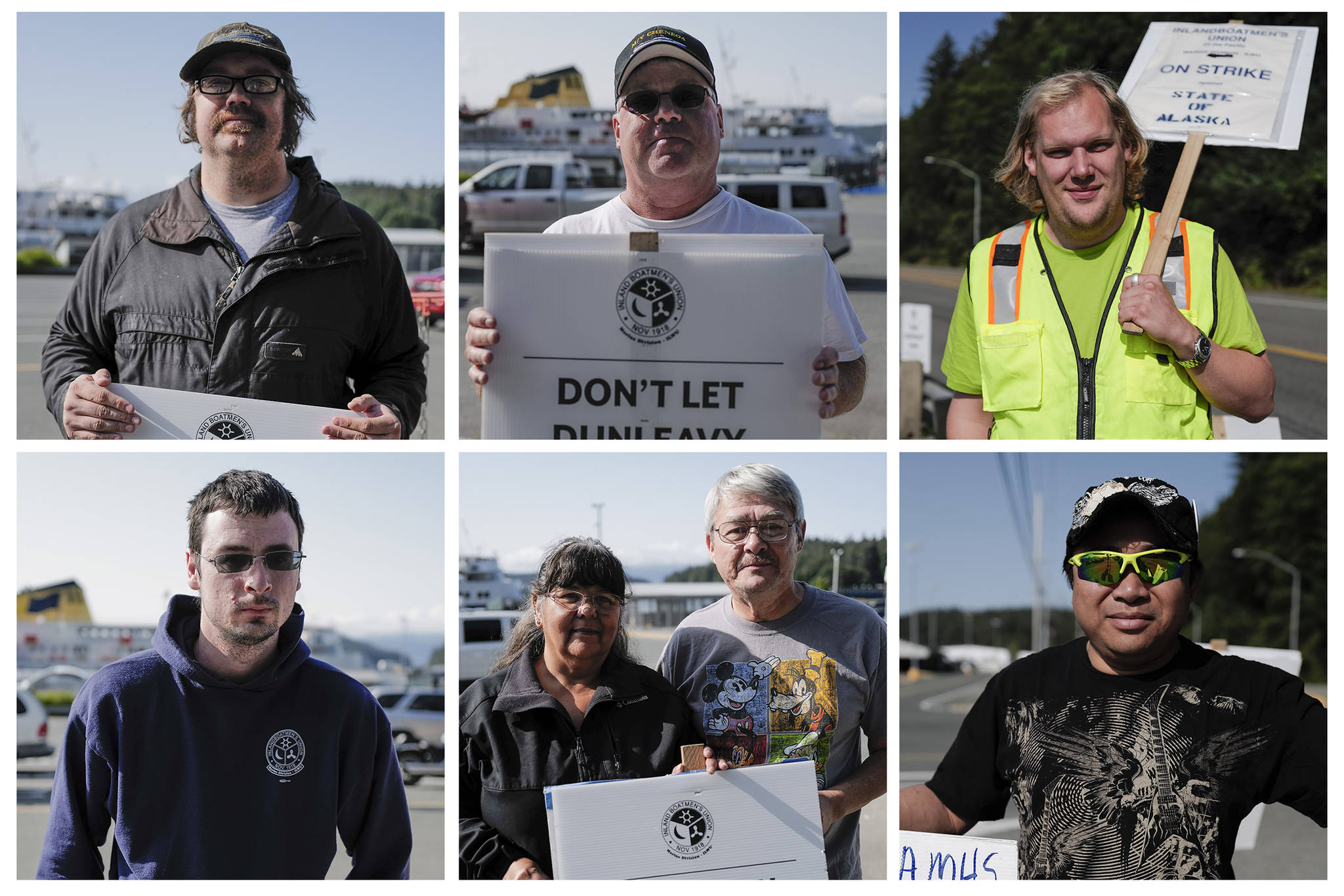Joseph Garrett came to Juneau by way of the Alaska Marine Highway System, and 11 years later he was among the group of striking workers manning a picket line at the Auke Bay Terminal.
Garrett, an able-bodied seaman for the AMHS and member of the Alaska Region of the Inland Boatman’s Union of the Pacific, was part of a good-natured gaggle of strikers who held signs and maintained a presence at the terminal Tuesday morning as the ferry workers’ strike stretched into its seventh day.
About every third or fourth car that passed the group expressed support for the striking workers, and that public sentiment means a lot to Garrett, who said he has not received a wage increase in his four years with AMHS.
“When they were talking about ferry cuts, the public had our backs, and I really respected that,” he said in an interview. “When a strike was called, I didn’t want to betray that. It made me conflicted.”
[‘We’re not giving up our ferries’: Hundreds rally at the Capitol]
However, Garrett said he’s found the same public that rallied around saving the system that ferries folks around Southeast Alaska has been generally supportive of the workers.
“A lot of people are asking me how they can show their support, and what would really be awesome is call the governor, make their opinions known and come out and let us know,” he said. “Come out and give us encouragement because it really goes a long way.”
The union authorized a strike effective last Wednesday and cited stagnate wages and using overtime instead of hiring more workers to meet scheduling demands as among the reasons for the strike. A release from the union also noted Gov. Mike Dunleavy’s support for cutting ferry funding.
The state’s perspective, as outlined in an editorial by Department of Administration Commissioner Kelly Tshibaka, is that the ongoing strike is illegal, IBU’s wage increase proposals have been unfeasible and illegal and the strike has so far cost the state over $2 million in refunded AMHS revenue while inconveniencing Southeast communities.
“The strike has shut down a major transportation artery in the height of tourist season. It has been the logistical equivalent of a heart attack to coastal Alaska,” Tshibaka wrote. “The damages suffered is already incalculable.”
Metlakatla Indian Mayor Karl Cook said in a phone interview Tuesday the strike is having an impact on the community of about 1,400 located about 240 miles southeast of Juneau.
Cook said on the first day of the strike, Metlakatla residents needed to be boated over to Ketchikan to make a flight in order to reach a medical appointment in Anchorage.
“Normally, they’d have taken the ferry,” Cook said.
A traveling cancer-screening van was unable to come to town because of the strike, Cook said, and expected freight shipments are likely to be delayed.
“So far, it’s just an itch, a minor irritation, but if it grows long, it’ll be bad,” Cook said.
Workers, as is the state, are also losing money to the strike, and Garrett said he’s feeling an itch to get back to work.
He said since furloughs are common in winter, summer months are a time when he can typically expect regular pay and insurance coverage.
“Maritime life is definitely difficult, and I signed up for it,” Garrett said of the scheduling quirks and workflow. “This is what I expected, but it can be trying at times.”
It also has its perks.
Garrett said being able to be with his young family is one of the main reasons he works for AMHS.
“It’s been really nice, it gives me a lot of free time with my family,” Garrett said.“I feel like I work here not for the money, but for the time home.”
Throughout the strike, members of Garrett’s extended family and circle of friends have asked how he, his significant other and his two young children, ages 1 and 4, are holding up.
“I would definitely say we’re a little stressed out,” he said. “Luckily, we’ve got savings and all that fun stuff, but it’s a little stressful trying to juggle family life with making sure I’m helping out the picket lines. That’s an added stress to the day.”
Garrett said right now he’d like to trade that for the the six-hours-on, six-hours-off shifts that he’s used to on board the Kennicott.
“Nobody wants to strike,” he said. “Nobody wants to be out here. We’d rather be out working.”
[‘We want to go back to work’: Ferry strike ongoing]
Robb Arnold, vice chairman for the IBU, said in an interview Tuesday he’s hopeful the union will be back to work soon.
Arnold would not elaborate on his reasons for harboring that hope or what contract terms would result in an end to the strike.
“We’re kind of on a self-imposed gag order,” Arnold said.
He said there’s a general desire among the union members not to fuel conflict via media statements, and added IBU is ready to work.
“We want this to move quickly,” Arnold said. “We have crews ready to get back to work. We think today’s the time… This is getting out of hand. We’re ready for a deal today.”
• Contact reporter Ben Hohenstatt at (907)523-2243 or bhohenstatt@juneauempire.com. Follow him on Twitter at @BenHohenstatt.

